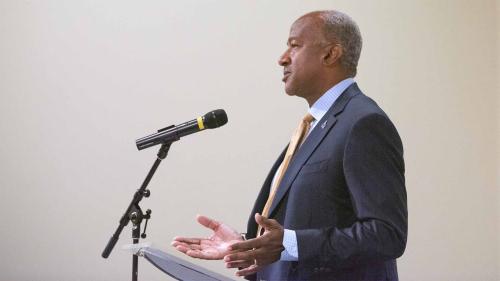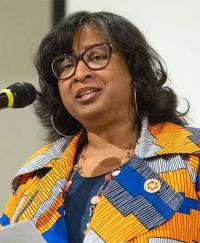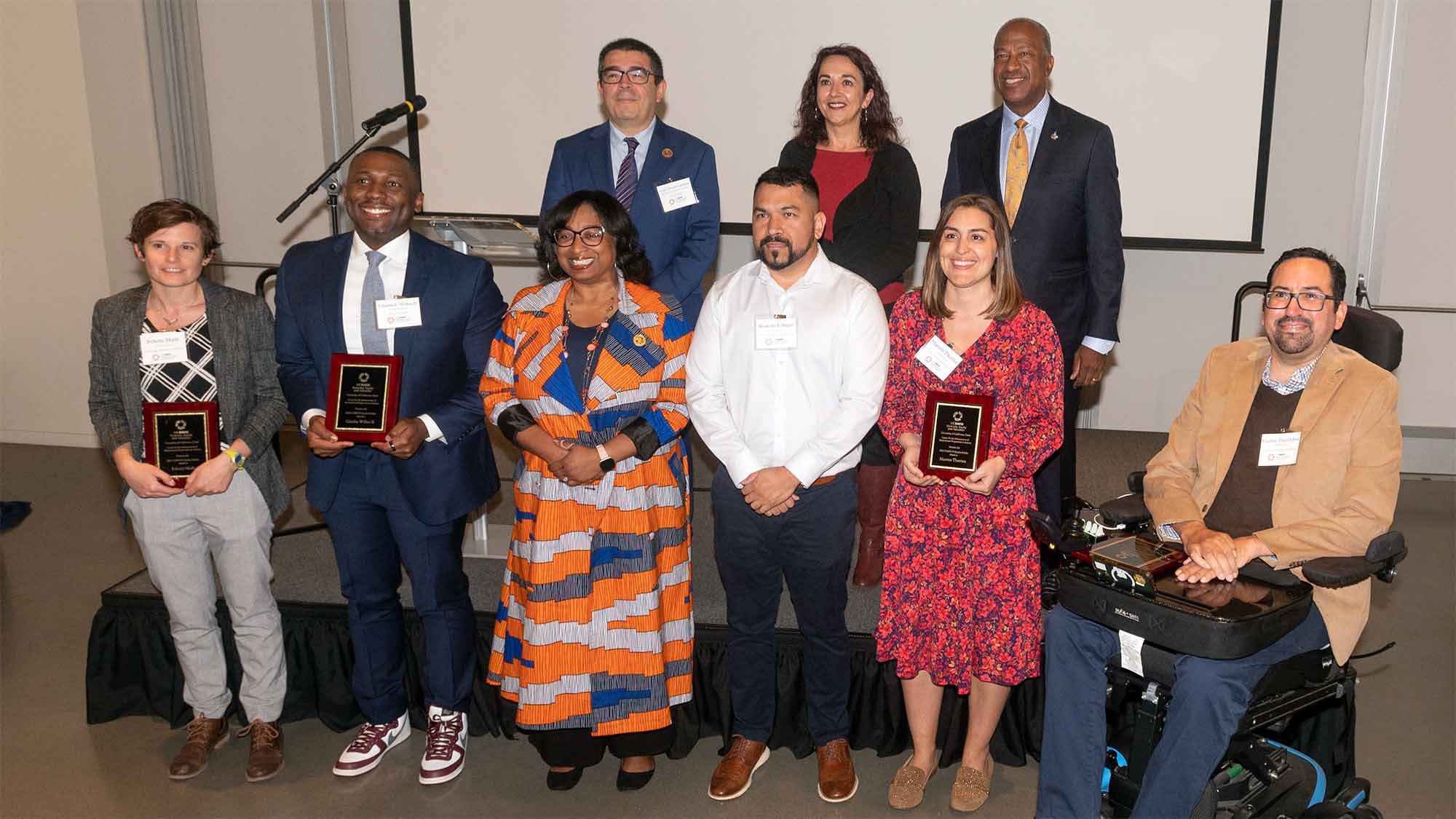New CAMPOS and CAMPSSAH Scholars Join UC Davis
CNS Core Faculty Martine Therrien honored at CAMPOS ceremony
Quick Summary
- Programs provide mentorship, support and community to new faculty members
- Other recent successes at UC Davis include NIH award and HSI eligibility
- New CAMPOS class is 10th in program history
UC Davis is continuing to make good on its commitment to welcome diverse voices, and earlier this month inducted nine new faculty members into programs that aim to bring multicultural and underrepresented perspectives to all fields of academia.
The new faculty scholars joined the Center for the Advancement of Multicultural Perspectives on Science, or CAMPOS, and the Center for the Advancement of Multicultural Perspectives on Social Sciences, Arts and Humanities, or CAMPSSAH. Their research spans fields including the interconnected nature of the ancient world, Black HIV/AIDS activism in the Bay Area, the immune response to infection and more.
“Faculty members like these bring diverse perspectives and backgrounds that are vital to spur creativity and discovery,” Chancellor Gary S. May said at their induction ceremony Nov. 6 at the Manetti Shrem Museum. “Empowering diverse researchers and scholars is key to finding solutions to society’s greatest challenges and building a stronger, more equitable future.”

Luis Carvajal-Carmona, professor of biochemistry and molecular medicine and the associate vice chancellor for academic diversity, praised the new class of scholars and thanked the chancellor and provost for their support.
“Our new cohort of CAMPOS and CAMPSSAH scholars are stellar academics from diverse backgrounds who will enrich UC Davis,” he said. “We are lucky that these uniquely talented scholars chose UC Davis to pursue their academic careers, they will have a positive impact in our campus and surrounding communities. We are grateful to Chancellor May and Provost Croughan for their unwavering support for CAMPOS and CAMPSSAH.”

Renetta Tull, vice chancellor for Diversity, Equity and Inclusion, echoed a sense of gratitude for the collective work that made it possible to bring on new classes of scholars.
"Partnership, collaboration, and shared vision are key to the success of the centers,” Tull said. “DEI is pleased to be part of the collective that includes the provost, Academic Affairs, and the deans to bring extraordinary scholars to UC Davis to be professors.”
Maxine Craig, faculty director of CAMPSSAH and a professor of sociology, called the scholars “exciting” and said she was glad to be around them at the induction ceremony. “This gives me hope that together we will keep doing the work.”
Verónica Martínez-Cerdeño, interim faculty director of CAMPOS and a professor in the Department of Pathology and Laboratory Medicine, praised the new cohort of scholars, and said CAMPOS provides both opportunities for career advancement and a way for the university to attract top-tier talent.
“The new scholars bring to UC Davis expertise in interdisciplinary fields that combine technology, science, and humanities,” she said. “The new class of CAMPOS scholars also reflect a movement toward more inclusive, diverse, and equitable hires to fill the ranks in academia.”

Successes earned through cooperation
UC Davis has been working together, and it shows: Earlier this year, the National Institutes of Health named the university to a list of just 10 institutions working to close gaps in diversity, equity, inclusion and accessibility in biomedical and behavioral disciplines. The award, the NIH Institutional Excellence in Diversity, Equity, Inclusion, and Accessibility in Biomedical and Behavioral Research Prize, came with a $100,000 award.
It called out UC Davis’ “diversity ecosystem,” including CAMPOS, as well as the transformative changes in the School of Medicine’s admissions process, an implicit bias training program for faculty search committees — Strength Through Equity and Diversity, or STEAD — and the university’s initiative to become a Hispanic-Serving Institution, or HSI.
That effort has also made major progress: This fall, UC Davis reached the enrollment threshold to gain eligibility to be designated as an HSI, making it eligible to be one of the nation’s few research-intensive universities to do so. The campus already secured the federal government’s status as a Minority Serving Institution in 2019 as an Asian American and Native American Pacific Islander-Serving Institution, or AANAPISI. Two designations position UC Davis to pursue a broader range of funding opportunities that will further support student success and strengthen academic programs.
A long history of support
The changes haven’t happened overnight, and this year’s new faculty members bring the total number of CAMPOS and CAMPSSAH scholars to 50 and 29, respectively. The 2024-25 class of CAMPOS scholars is also the 10th in the program’s history.
CAMPOS emerged out of UC Davis ADVANCE, a National Science Foundation-funded program aimed at increasing the participation of women in academic science and engineering careers. That NSF-backed program began in 2012, and the first class of CAMPOS scholars joined UC Davis in 2014.
Linda Bisson, faculty director for UC Davis ADVANCE and professor emeritus of viticulture and enology, said the university doesn’t pursue efforts like this to chase diversity statistics, which can be reached without making systemic changes. The real goal, Bisson said, is equality.
“We think of it as eliminating barriers to equality, not just having diversity,” she said. “If your goal is genuine equality … diversity is an outcome of that.”
UC Davis has pursued a broad diversity ecosystem because “different communities have different barriers for genuine equality,” she said.
The mission of CAMPOS continues as part of that ecosystem — while the five-year NSF grant for UC Davis ADVANCE has been exhausted, CAMPOS is now housed under the Division of Diversity, Equity and Inclusion.
Tull said at the Nov. 6 event that DEI as a philosophy and goal ultimately helps everyone, including the institution.
“It's the foundation that allows all of us to work more effectively, support one another, and create a university that truly reflects the world that we are striving and continuing to strive to impact,” Tull told the crowd. “Together, we are building a UC Davis that is not only prepared for the future, but equipped to lead it, setting a standard of excellence that will inspire other institutions.”

Helping new faculty
The newest class of CAMPOS and CAMPSSAH faculty scholars are already seeing the benefits of that support.
Antoine Johnson, an assistant professor of African American and African studies and one of this year’s CAMPSSAH faculty scholars, said he has gotten tips from fellow CAMPSSAH scholars to help him adjust to his first quarter on campus, like ways to schedule his days to balance teaching and research. He said he’s also forming a writing accountability group with fellow scholars.
“It’s a good environment,” he said. “I was fortunate to become a scholar.”
Vladimir Diaz-Ochoa, an assistant professor of pathology, microbiology and immunology, praised CAMPOS for having “a built-in community that welcomes you to UC Davis.”
Craig, the faculty director of CAMPSSAH, said connections between scholars are a major benefit of CAMPOS and CAMPSSAH, especially when someone is looking for a collaborator outside of their own department.
“Those kinds of interdisciplinary connections are something that makes Davis a really special place,” she said.
The groups also help facilitate less formal connections, like set times when faculty members can come to an office and write alongside others who are also seeking to stay on track.
It’s important to stay engaged with CAMPOS and CAMPSSAH scholars once they arrive on campus to maintain the programs’ dual goals of recruitment and retention, she said.
“It’s one thing to recruit — it’s another to make people want to spend their careers here,” Craig said.
That too appears to be working — five of the six members of the original cohort of CAMPOS scholars are still at UC Davis a decade later, and at least one member of the 2016-17 cohort attended the Nov. 6 induction.
In addition to support from peers, the faculty scholars in these two programs have backing from the highest levels of the university.
“Know that you have the full support of UC Davis as you continue to forge new paths forward,” Tull told the new scholars at their induction ceremony.
Carvajal-Carmona said the diversity ecosystem at UC Davis is “thriving,” making its efforts even more effective.
“A lot of institutions have programs that are isolated — [here] everyone is pursuing the same goals,” he said. “This only happens in Davis, I tell you.”
Meet the newest scholars
The 2024-25 faculty scholars, all assistant professors, are:
CAMPOS
- Vladimir Diaz-Ochoa, Department of Pathology, Microbiology and Immunology, School of Veterinary Medicine
- Antonio Serapio-Palacios, Department of Microbiology And Molecular Genetics, College of Biological Sciences (joining UC Davis in 2025)
- Rodolfo Urbano, Department of Pathology, Microbiology and Immunology, School of Veterinary Medicine
- Charles Wilkes II, School of Education
Two members of the 2023-24 class of CAMPOS scholars who joined UC Davis this year were honored at the ceremony:
- Felicity Muth, Department of Neurobiology, Physiology and Behavior, College of Biological Sciences
- Martine Therrien, Molecular and Cellular Biology, College of Biological Sciences; Center for NeuroscienceCAMPSSAH
CAMPSSAH
- José Manuel Santillana Blanco, Department of American Studies, College of Letters and Science
- Natalia Duong, Department of Asian American Studies; and Department of Science & Technology Studies, College of Letters and Science
- Bianca Hand, Classics Department, College of Letters and Science
- Cj Jackson, Department of Native American Studies, College of Letters and Science
- Antoine Johnson, Department of African American and African Studies, College of Letters and Science
Media Resources
Cody Kitaura is the editor of Dateline UC Davis and can be reached by email or at 530-752-1932.
